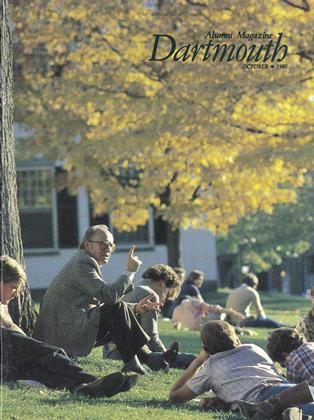Take everything the average American knows about India and put it on the head of a pin, and there'll probably be enough room left over for a few angels to dance. "To us India watchers," says former U.S. Ambassador Robert Goheen, "it's distressing the extent to which Americans are ignorant of India."
To address this shortcoming, the Indian government, with the collaboration of the College and other repositories of culture and learning, is staging an 18-month extravaganza to expand Americans' awareness of the world's largest democracy. Hundreds of events are scheduled for this year and next at universities, museums, and performing arts centers across the country to round out the American view of India - now dominated by The Jewel In theCrown and other pop culture offerings.
As part of the Festival of India, another former ambassador, John Kenneth Galbraith, joined Goheen and several Indian ambassadors and ministry officials at the College in August for a colloquium on U.S.-India relations. Panelists at the two-day symposium covered some familiar ground, with Indian Ambassador Kayatyani Shankar Bajpai calling continued U.S. military aid to Pakistan the major stumbling block to better relations. But the audience at a panel discussion on economic ties might have been a little surprised to hear Galbraith predict that India is on the verge of becoming an economic success story and another low-wage competitor ready to do battle with American industry. Imports of Indian steel and textiles are a source of friction already and, Galbraith said, more friction on the trade front is inevitable. Listeners at a panel on U.S.-India cooperation in the United Nations learned there isn't much, if you take at face value the fact that the U.S. votes with India less often than with the Soviet Union. India's deputy representative to the U.N. received a thorough grilling from the audience on India's refusal to establish full diplomatic relations with Israel - a position taken by some as anti-Semitic and did not appear to satisfy many listeners with the answer that India doesn't recognize any country that forcefully occupies foreign territory . . . with the exception of the Soviet Union.
The American perception of India is uninformed, not negative, said Minister of Culture Niranjan Desai. The purpose of the Festival of India is to show the world there's more to his country than "Gunga Din, Taj Majal, and Indiana Jones and the Temple of Doom."
The colloquium at Dartmouth happened to fall during Alumni College, and it was a happy coincidence. Many alumni attended the panels, which appeared to at least begin the process of demystifying India. Some, like Kathy Marchant, wife of Robert Marchant '57, said the colloquium helped them gain a better understanding of India's position as a nonaligned nation not an easy concept, she said, for Americans more comfortable with an outlook that "automatically divides the world into good guys and bad guys."
"I had very vague perceptions about India, and they're beginning to come into focus," said Chuck Venrick '36. "All I knew about India was what TV tells me."
Goheen doesn't see a need for the U.S. and India to become "terribly close," but he feels it's in America's interest to foster somewhat closer ties because India is an "enormously big and powerful nation" where democracy is strong and resilient. According to Goheen, India shares with the United States "all of the values that we think make a better world."
The College has organized a number of events in conjunction with the Festival of India: an exhibit of Indian art; a dance performance; a film festival that will feature the work of Satyajit Ray, one of India's foremost filmmakers, as well as popular Western films such as Gandhi and Heat andDust; and a symposium on Third World agriculture, with special emphasis on India.
Art is not concerned with conformity, but, on the contrary, with new forms, new vistas, new techniques. We must be alive to them if we are fully to experience their riches." —William Schuman, the president of Lincoln Center, at Dartmouth's 1962 Convocation on the Arts
 View Full Issue
View Full Issue
More From This Issue
-
 Cover Story
Cover Story"Are the fireflies ghosts?"
October 1985 By Priscilla Sears -
 Article
ArticleEfrain Guigui: Well-tempered conductor
October 1985 By Georgia Croft -
 Sports
SportsOn the road to Cambridge. The Harvard Game
October 1985 By Jim Kenyon -
 Class Notes
Class Notes1979
October 1985 By Burr Gray -
 Article
ArticleThomas V. Seessel '59: "It's okay to say 'No' "
October 1985 By Rex Roberts -
 Class Notes
Class Notes1982
October 1985 By Emily P. Bakemeier
Article
-
 Article
ArticleMarriner Rites
December 1937 -
 Article
ArticleMedical School Contributors
March 1950 -
 Article
ArticleSecretary to the President Awarded Dartmouth Degree
July 1954 -
 Article
ArticleAcademic Delegates
February 1956 -
 Article
ArticleSoccer
OCTOBER 1966 By DICK BALDWIN -
 Article
Article"THE COLLEGE ON THE HILL"
June 1935 By W. J. Minsch Jr. '36


